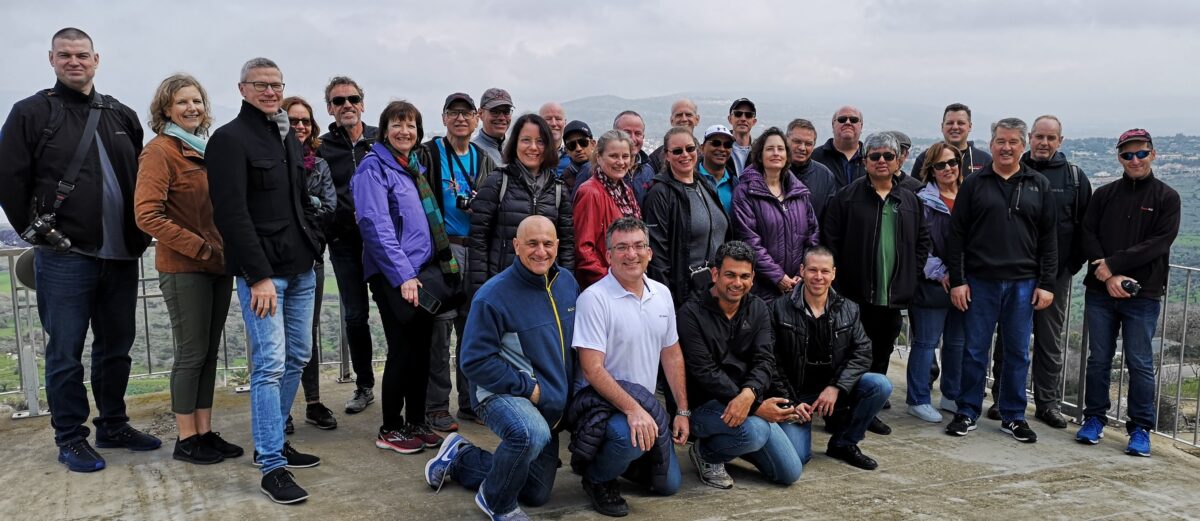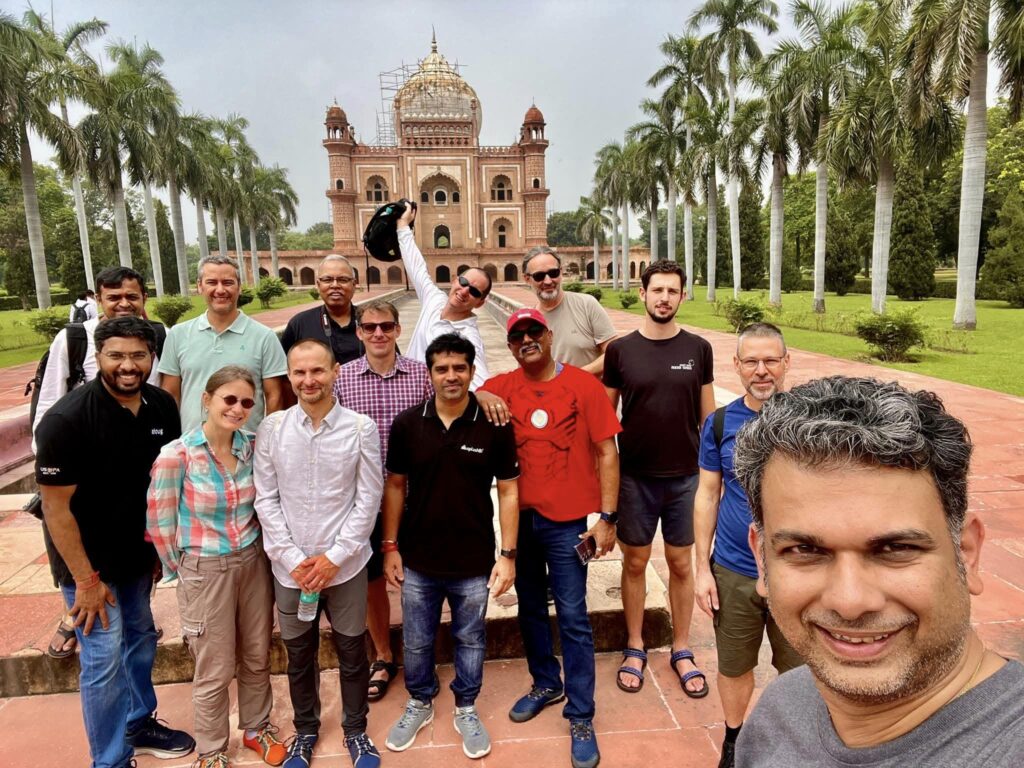Exactly ten years ago, in November 2014, I gave my first presentation at a conference outside my country and not in my native language.
At that point, I already had over twenty years of career experience in software development, focusing on databases – my long-lasting passion. I’ve always believed in knowledge sharing, and during those years, I enjoyed giving occasional presentations – sharing from what I learned and from the experience I gained – but I always presented in Hebrew and always in Israel: in companies I worked for, in the historical DBA Forum of ilOUG (Israel Oracle User Group) and at some local conferences.
Sharing and Learning
I discovered that when you build a presentation and prepare to deliver it, you learn a tremendous amount yourself. For example, in 2013, I took it upon myself to deliver a full-day seminar on the new features for developers in Oracle 12c. Since this version had just been released at the time, no one here had the experience and knowledge – and consequently, the desire – to build and deliver such a seminar in Israel. I volunteered to do it and spent many days preparing the seminar, during which I learned a lot. It’s likely that without the goal of preparing and delivering the seminar, I wouldn’t have learned so much new (and useful) content in a relatively short time period and at such a deep level.
To learn, I also used materials published by members of the international Oracle community – both Oracle users and Oracle employees.
Here’s a post I published then, containing the list of topics I included in that seminar.
I regularly read materials shared by community members (and learned a lot from them), and I heard about user group conferences around the world.
I realized I could develop more professionally, learn more, and share my knowledge with more people if I stepped out of my comfort zone, traveled to conferences worldwide, and presented in English – a language I naturally find more challenging to express myself in.
It wasn’t easy, it was even scary, but I took heart and decided to try. I submitted abstracts to several conferences, and finally two of them got accepted.
My Trial by Fire
And so, in November 2014, I arrived in Nuremberg for the DOAG conference, one of the largest Oracle user group conferences in the world.
It was a fascinating experience, somewhat frightening, and very enlightening.
I understood that this step meant much more than I had thought.
For instance, the opportunity to meet product managers face-to-face – the people directly responsible for the software and features I use. To talk with them, consult with them, complain to them. Even to have lunch with them, like what happened with Bryn Llewellyn, who was then the product manager for PL/SQL and EBR.
The first presentation I gave at that conference (and as mentioned, my first-ever presentation abroad, in English, and in front of a large audience) was about EBR.
As I was preparing on stage, just before starting the presentation, nervous and excited, someone approached me and said “Excuse me, I’d like to introduce myself: I’m Bryn, the product manager for the topic you’re about to present on.”
Of course, that wasn’t the best antidote for my nerves…
I replied that I knew very well who he was (I had read his articles, seen his videos), and that it was a great honor for me, as well as terrifying. He was incredibly nice and said “I just wanted to say I promise not to interfere, and if you want my help, you’re welcome to ask.”
A real bonus for me: @BrynLite in my #oracle #EBR presentation at #DOAG2014 pic.twitter.com/S2IVLJCipg
— Oren Nakdimon (@DBoriented) November 18, 2014
The presentation went quite well, and afterward, I had lunch with Bryn, where he already solved one problem I had with EBR (how to run a job in a specific edition – you associate the job with a class, the class with a service, and the service with an edition).
Bryn helped me quite a lot afterward, we continued to meet at conferences and exchanged opinions. When he came to Israel he visited my workplace, and he encouraged me to attend Oracle’s big conference in San Francisco – Oracle OpenWorld – and we even gave a joint presentation there, and he was a staunch supporter.
None of this would have happened if I had stayed at home and only learn from what he and others published.
With @BrynLite, preparing to our #EBR talk tomorrow pic.twitter.com/Ug2DZI8HgH
— Oren Nakdimon (@DBoriented) September 20, 2016
Access to Oracle product managers not only helps solve problems (like the advice I received at that lunch ten years ago) but also allows influencing the product’s future. There’s a lot of listening to users that translates into actions.
An example from my experience is the USER_TRIGGERS_AE dictionary view that was added in version 19c.
Another example is the support of both pre-update and post-update values in the DML RETURNING clause that was added in version 23ai.
The Community
Since DOAG 2014, I’ve participated in dozens of conferences in about 20 countries. I became part of a community of hundreds of people from around the world, with shared interests, united most of all by their desire to contribute to others, share their knowledge and experience, and collaborate with each other.
The Oracle ACE program has a big and important role in building and maintaining this community, and many of us are members of the program. The program recognizes, rewards, and promotes technical experts and community leaders for their contributions to the Oracle community.
Another group I’m a member of is Symposium 42, which was created by the Oracle database community to support the Oracle database community. All members are experts in creating & sharing technical content or organizing community events and activities.
I have many interactions with my community peers on professional topics.
There’s always someone to consult with and get guidance from.
Getting honest feedback on your post or presentation from people whose opinions you greatly value is priceless.
The opportunity to do a joint presentation with someone like Connor is something I wouldn’t have dared to dream about ten years ago.
What could be more exciting than presenting at @CloudWorld 2023 ???
Presenting there together with @connor_mc_d 🤩Join our “Write Less With More” session:https://t.co/ym6vr8qLAM#OCW @oracleace #ACED #SQL #PLSQL pic.twitter.com/5UNTLyH6FN
— Oren Nakdimon (@DBoriented) August 28, 2023
The Friendship
But this community is much more than just a group of professionals with shared interests. Real friendships form, people support each other, and of course, enjoy drinking and eating together.
In times when there are many troubles and conflicts in the world, it’s heartwarming, and even hopeful, to see people from different countries and different cultures simply sit, drink, chat, and enjoy together.
Here for example – 7 people from 7 different countries:
That was a great evening at OOW16 with @dbaOnTap @DBoriented @johnnyq72 @petemahon @OyvindIsene @MDWidlake pic.twitter.com/a1uxM1QLcL
— Brendan Tierney (@brendantierney) September 23, 2017
During this journey that I started ten years ago, I gained a new circle of friends from many countries.
People I used to admire from afar for their knowledge and the way they share it in books, blogs, or videos – I’m proud today to call them friends (and still admire some of them 🙂).
I remember one evening many years ago at OOW in San Francisco, when I ran into Tim on the street, and he noticed I was a bit lost and down, and immediately took me to get something to eat. It was the most natural thing for him, and for me it emphasized how much this community is far beyond just sharing knowledge about features.
And there are many more examples. Here are just a few of them:
The warm hospitality of Alex and his family when I came with my wife and children for a vacation in their country.
The first time I met Erik, when I came to a conference in the Netherlands, and he was so welcoming and warm that in an instant I felt comfortable in the company of people I hadn’t known before.
When Jože heard at a conference in Ireland that I also bake bread, and gave me half of the sourdough starter he had brought for Martin.
Actually, sourdough bread is a serious matter of deep discussions with Martin, Jonathan, Gerald, and others. Which also reminds me of the discussions about pizza ovens with Maria.
My #OracleSourdough friends, have you ever tried making pancakes from your sourdough starter?
I’ve recently started, and they are delicious.
And it’s better than throwing away the excess while feeding the starter.@MDWidlake @JLOracle @GeraldVenzl pic.twitter.com/pz2OEjaEtC— Oren Nakdimon (@DBoriented) May 15, 2021
Driving a very small car in Slovenia with Heli, Javed and Kamran (once again, each one of us from a different country).
A very unique experience was traveling around India together with my son Nimrod at OCYatra, along with Sai, Mike, Connor, Sandesh, Dimitri, Pedro, and others.
In the last year – a challenging period in my country during which I haven’t traveled – many friends moved me by showing interest and concern for my family’s well-being.
Local User Groups
Many members of the international community are also active in their local user groups, which benefits the various organizations and allows even smaller organizations to bring international-level content to their members.
I, for example, as an active member in the Israeli organization, helped organize conferences and meetups in Israel where speakers from around the world participated.
The crown jewel for me was in 2020, the last conference we held in Israel before COVID, during which I had the honor of hosting my fellow speakers at my home.
2 years ago today. #ilOUG Tech Days 2020 speaker trip to the Galilee. pic.twitter.com/258rmzaxjf
— Oren Nakdimon (@DBoriented) February 2, 2022
I hope to continue being active and contributing more to the community. I’ll update again in 2034 🙂



That’s a lovely post Oren. The Oracle community has gained so much from you being a member of it. I’m so glad you made that first step into the world-wide community in Nuremberg.
I *really* should try the pancake idea!
Thanks so much, Martin.
I believe that part of the ACE code should be to identify and encourage local speakers into the program. You are an excellent example that now shares across the world. That opportunity for you, that you were brave enough to take, is a blessing for the global community
Thanks so much, Debra.
Hi Oren,
I am so glad to have been one of the attendees of your first presentation, back in 2013,
and of so many others that followed 🙂
I still hope for better times, including other local events, maybe including a
“live pancake training” for beginning Oracle cookers 🙂
Just now, reading back, I saw Martin’s post also mentioning the pancakes …
so, another common point for us, besides Oracle and cats 🙂
Best Regards & Enjoy your further sessions,
Iudith Mentzel
Thanks so much, Iudith.
Yes, we can add a “Tuning and Baking” workshop to the next conference 😀
Wow so well written Oren . It’s a privilege to know you and also present in that 2020 conference ILOUG. To host you and Nimrod in India was so much fun. Hope to see you soon somewhere
Thanks so much, Sandesh.
I very much enjoyed reading this, Oren. It made me feel nostalgic about the world of work and the international community of friends that it brought me—and still brings you. Nevertheless, while work was good, retirement is (just a little bit) better! Thanks for your championship of EBR—and keep up the good work.
Best wishes, Bryn
❤️